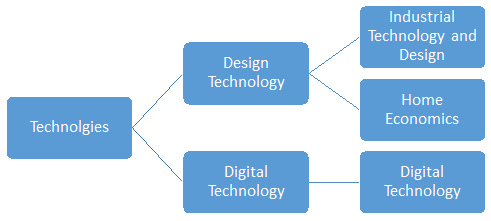The curriculum area of Technologies at Park Ridge SHS consists of the two distinct subject areas: Design Technology and Digital Technology.

Technology subjects aim to develop the knowledge, understanding and skills to ensure that students:
- investigate, design, plan, manage, create and evaluate solutions
- are creative, innovative and enterprising when using traditional, contemporary and emerging technologies, and understand how technologies have developed over time
- make informed and ethical decisions about the role, impact and use of technologies in the economy, environment and society for a sustainable future
- engage confidently with and responsibly select and manipulate appropriate technologies − materials, data, systems, components, tools and equipment − when designing and creating solutions
- critique, analyse and evaluate problems, needs or opportunities to identify and create solutions.
In the junior school, students can select between the following subject options:
Digital Technologies has been introduced across the Junior School in order to fulfil the Australian Curriculum requirements for Digital Technologies. This subject area focuses on using the design process to solve real world problems in order to create a better future. It does this within the context of digital solutions including robotics, game design, application development, website design, data management and networking.
Year 7 - One term for all students
Students study an introduction to Programming through Robotics using Edison Robots. They will learn about computational thinking and project management, developing skills in creating algorithms and flowcharts.
Year 8 - One semester elective
Students study how data and networks connect together before developing and applying STEM and coding skills to develop databases that solve real-world challenges.
Year 9 - Full year elective
Students study website and media design and start making their first functioning site using HTML & CSS code and Adobe Photoshop. Students then get an introduction to the Internet of Things by programming microprocessors using Python languages to achieve outcomes to common issues. Students design a new platform game using Construct3 game-making software that they can then publish and play into the future.
Home Economics offers students opportunities to discover and develop their critical and creative capabilities that enhance individual and family wellbeing. Through the contexts of food and textiles students explore the practical environment of a home economics kitchen and computerised sewing machines. This program is aims to assist individuals to make better lifestyle choices, in both nutrition and sustainability.
Year 7 - one term for all students
An introduction to Home Economics through the development of skills in food. Students explore the practical environment of a Home Economics Kitchen and Computerised sewing machines that sew and embroidery.
Year 8 - one semester elective
Students learn about food groups including snacks, before setting out to create their own 'Super Snack' variation. Students then learn about textiles and are challenged to create their own for real-life scenarios.
Year 9 Food and Nutrition - one semester elective
Food and Nutrition at this level involved the study of international and world cuisines. Students will learn about the origins of food across the planet and then research, design and create their own signature cultural dish.
The Industrial Technology and Design Department at Park Ridge SHS offers a range of subjects with a creative design focus as well as the development of quality technical skills. Students will gain practical skills and theoretical knowledge through a hands-on project based course of learning. Students will complete set skill tasks, design and create products using a range of materials, tools, equipment, processes and techniques using specific industry technology. Students will be challenged to understand the appropriateness of products, as well as the social, ethical, safety and environmental issues pertaining to materials use and disposal. Students will be required to manage activities that require them to meet constrains of time, cost, materials and availability of resources.
The department facilities included 8 workshops areas and 2 designated CAD computer room catering for a range of practical and drawing based subjects. Each area is well resourced with industry standard equipment used in the delivery of the curriculum.
Junior subjects
Industrial Technology and Design (Year 7-8)
Students will gain practical skills and theoretical knowledge through a hands-on project based course of learning. Students will complete set skill tasks, design and create products using a range of materials, tools, equipment, processes and techniques using specific industry technology. They consider the way characteristics and properties of technologies can be combined to design and produce solutions to problems.
Wood Technology (Year 9)
In this unit students will develop skills in technology within the woodworking industry. Students will have an opportunity to develop practical skills and knowledge in a range of wood bias materials and processes. Elements of design and quality workmanship are incorporated in a number of project based tasks.
Metal Technology (Year 9)
In this unit students will develop skills in technology within the metalworking industry. Students will have an opportunity to develop practical skills and knowledge in a range of metal bias materials and processes. Elements of design and quality workmanship are incorporated in a number of project based tasks.
Industrial Graphics (Year 9)
This Industrial Graphics subject focuses on the underpinning industry practices and drafting processes required to produce the technical drawings used in industries today. It provides an opportunity for students to experience the challenge of producing technical Computer aided drawings to be used in manufacturing operations to produce working models and products.